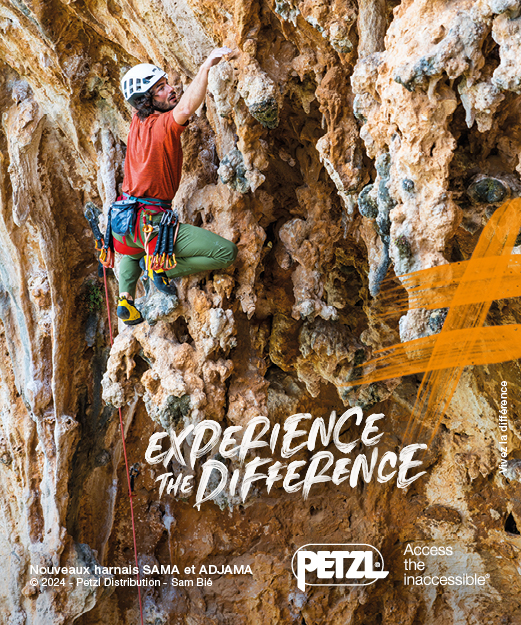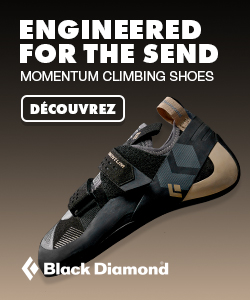Lynn Hill : “I don’t consider that I am at the end of my career”

Mainly known for completing the first free climb ascent of The Nose route on El Capitan in Yosemite Valley in 1993, Lynn Hill is a prominent figure in the world of climbing. She has excelled in all areas, including competitions, cliffs, and big walls… She reflects on her journey for La Fabrique Verticale.
Sometimes we talk about the need to mourn at the end of a high-level career. How did you personally experience the end of your climbing career?
Lynn Hill : I don’t consider that I am at “the end of my career”. Though I don’t have any sponsors at this point (other than receiving climbing/hiking shoes, a few Arcteryx products, and Petzl gear), I still work in the realm of climbing as a speaker, coach, and I have created a video called, The Fundamentals of Climbing, which brings in some money (however, I spent a lot of money to create it). You can see the introduction to this video on my YouTube channel.

Regarding your retirement, did you anticipate the date, or did injuries/psychological wear and tear gradually lead you away from high level ?
Lynn Hill : I stopped participating in competition before it was so demanding that injuries were a big part of the experience. I decided to stop competing because I wanted to focus on outdoor rock climbing and other aspects of life. I like to do other activities besides climbing: skate skiing, Ashtanga yoga, and other non climbing related activities that most people enjoy (making food and having meals with friends, watching movies, going for walks with my dog, etc…)

Do you still climb with a focus on performance ? Or have you shifted to a different approach?
Lynn Hill : I climb for my own pleasure. So I don’t usually have any specific “logique” associated with my performance. I just try to be efficient, and do challenging routes that are aesthetically pleasing with people I enjoy being with. However, this year I did have a specific project. I recently bolted a new multi-pitch route in the Flatirons of Boulder called, Queen-line (8a+ or 8b?) with Sasha DiGiulian. This was a lot of work since the wall is overhanging and traverses to the side on the last pitch. This project was filmed and will be a part of the Sasha DiGiulian documentary, which will air on HBO Max next June. I was also recently interviewed for a documentary film about Emily Harrington. So I still do some consulting work as a spokeswoman for climbing.

Have you ever experienced or do you sometimes feel frustration at not performing at the same level anymore? If yes, what strategies have you used, and what resources have you relied on to overcome it?
L. H. : Climbing has been a deep passion of mine. And I have been careful to separate my passion from my career. I still love to climb. And I don’t want my so-called “career” to spoil that passion. I am less concerned about evolving to the next level in climbing than simply being happy as a climber and being able to support myself after dedicating my life to this activity.
I’ve anticipated being in this situation of no longer having sponsorship from the Outdoor industry for many years. So I have invested my time and money in a way that allowed me to survive without this support. Since 2015 (the end of sponsorships), I’ve rented my main house on Airbnb. So that I could make some additional money at home while raising my son. My priority was raising my son and making a living rather than trying to be the best climber I could be.

Have you found another area in which you find fulfillment and that has helped you navigate this transition more smoothly?
L. H. : What makes me feel good about my choices in life with regard to my career, is seeing that people appreciate my services (coaching, speaking, video production and consulting). And that I’m able to make a living offering those services. I believe that every person is special and has unique contributions to offer others. We should all honor what we are passionate about and focus on doing our best to utilize those unique skills to make a living.
As a woman, how did you experience the transition through menopause ? Did the experience of retiring from competition help you in this other form of transition ?
L. H. : All of my experiences as a person and climber throughout life have been helpful in confronting each new challenge in life!! I had particular health issues (fibroids). So I chose to have surgery to remove them (and my uterus) at the age of 44. This was not a fun transition due to “hot flashes” and maybe some hormonal imbalances. But it wasn’t as difficult as it can be for many women. I feel fortunate to have good health and no serious injuries that would prevent me from enjoying climbing. I plan to continue climbing for as long as possible!









Your blog is a true gem in the world of online content. I’m continually impressed by the depth of your research and the clarity of your writing. Thank you for sharing your wisdom with us, especially about tăng traffic.
I’ve been a fan of Lynn Hill since before “It goes boys!”, which only solidified my administration.